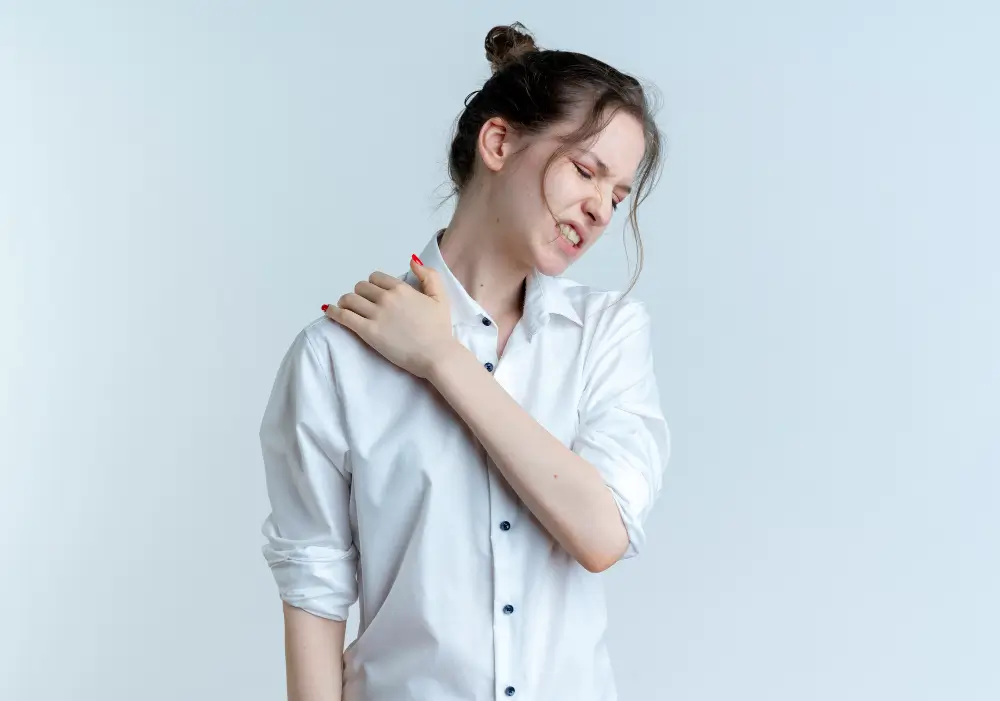How to Relieve Shoulder Pain After Laparoscopic Surgery at Home
It begins as a dull ache—then suddenly turns sharp, catching you off guard with every movement. You expected some soreness, but this? What if there’s more to it than just recovery? Discover the surprising cause behind post-surgery shoulder pain and the simple steps you can take at home to feel better, faster. Ready to learn how to relieve shoulder pain in ways you might not expect?
Get back to your active life—Schedule your shoulder pain management session now!

Home Remedies to Relieve Shoulder Pain
After laparoscopic surgery, shoulder pain is common. Fortunately, there are several home remedies that can help reduce discomfort and improve your recovery. Some effective strategies include:
Cold compresses: A helpful option during the first few days.
- How to use: Place an ice pack wrapped in a clean towel on the shoulder.
- Duration: 15 to 20 minutes, 3 to 4 times per day.
- Benefit: Reduces swelling and soothes localized pain.
Anti-inflammatory medication: Pain relievers can help manage discomfort effectively.
- Recommended types: Ibuprofen or acetaminophen (Tylenol), always following medical advice.
- Note: Follow your doctor’s specific guidance on dosage and timing.
Gentle exercises and stretches: Keeping the shoulder moving helps prevent stiffness.
- Suggested movements: Gentle range-of-motion exercises and light stretching.
Physical therapy and massage: Guided treatment can support healing.
- Therapy: A therapist can recommend exercises that match your pain level.
- Massage: Helps improve circulation, ease stiffness, and relax the muscles.
Rest and elevation: Adequate rest supports healing.
- Tip: Avoid activities that increase pain.
- Elevation: Keep the shoulder raised to reduce swelling.
Sleep position: Quality rest is part of the recovery process.
- Tip: Lie on the affected shoulder and hug a large pillow for support.
- Goal: Keep the shoulder properly aligned and relaxed during sleep.
Hydration and nutrition: Staying well-hydrated may help reduce internal inflammation.
- Tip: Drink plenty of water throughout the day.
- Natural aid: Green tea may provide mild anti-inflammatory effects.
Relieving shoulder discomfort after laparoscopic surgery is possible with simple care at home. Pay attention to your body, and if pain continues or worsens, reach out to a healthcare provider. Your comfort and safety come first.
Is It Normal to Have Shoulder Pain After Surgery?
Shoulder discomfort is a normal response after laparoscopic surgery. This pain, called post-laparoscopic shoulder pain, is primarily caused by the gas (carbon dioxide or CO₂) used during the procedure.
The gas inflates the abdominal cavity to provide better visibility and space for the surgeon. When gas remains trapped beneath the diaphragm, it can irritate the nerves connected to the shoulder and cause referred pain.
Why does it happen?
CO₂ can travel and collect under the diaphragm, irritating the phrenic nerve, which links the diaphragm to the shoulder. The pain is felt in the shoulder even though it originates elsewhere.
How long does it last?
In most cases, shoulder pain fades after a few days. As the gas is naturally absorbed, the irritation and discomfort lessen. In some people, the pain may last longer and may even feel more uncomfortable than pain at the incision sites or in the abdomen.
Who experiences it?
Between 35% and 80% of patients experience shoulder pain following laparoscopic procedures. There’s no confirmed link to age, sex, or body mass index.
Shoulder pain after laparoscopic surgery is common and usually temporary. With time and appropriate home care, most patients recover well.
What to Avoid After Surgery
To reduce shoulder pain and support healing, avoid the following during recovery:
- Lifting heavy objects or making sudden movements for at least a month
- Intense physical activity or exercise without medical approval
- Driving until fully recovered and off narcotic medications
- Foods that cause gas, such as dairy, legumes, broccoli, or cauliflower
- Alcohol while taking pain medications
- Sharing your prescribed medications with others
- Ignoring your doctor’s instructions about wound care, medication, and activity levels
These precautions can help prevent complications and reduce discomfort. Respecting your body’s healing process allows for a smoother, safer return to your routine.
When to Call Your Doctor
Shoulder pain after laparoscopic surgery is usually temporary and manageable at home. There are times, though, when it may be a sign of something more serious.
Contact your doctor if the pain is severe, doesn’t improve with medication, lasts beyond several days, or is accompanied by symptoms like fever, breathing difficulty, or significant abdominal discomfort. These signs may suggest complications that need medical attention.
Shoulder pain can last up to two weeks in surgeries involving the upper abdomen. Watching for changes and responding early can make a big difference in your recovery. If you’re unsure, reach out to a professional—it’s always better to ask.
Sources:
- Sao, C. H., Chan-Tiopianco, M., Chung, K. C., Chen, Y. J., Horng, H. C., Lee, W. L., & Wang, P. H. (2019). Pain after laparoscopic surgery: Focus on shoulder-tip pain after gynecological laparoscopic surgery. Journal of the Chinese Medical Association, 82(11), 819-826.